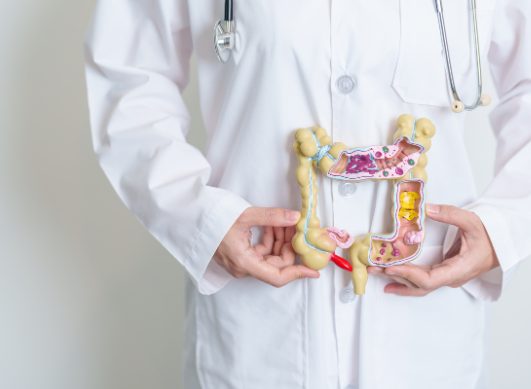Little-known risk factors for colorectal cancer: Diet, gut microbiome, and more
Published Feb 21, 2025 • By Candice Salomé
Colorectal cancer is the third most common cancer in the US, and more than 150,000 new cases are diagnosed annually. It develops due to the growth of malignant tumors in the colon or rectum and affects both men and women almost equally. Some risk factors, such as age, family history, and a sedentary lifestyle, are well known, but others are much less talked about.
So, what are the lesser-known risk factors for colorectal cancer? And how can you lower your risk?
We explain everything in this article!

What is colorectal cancer?
Colorectal cancer is a malignant tumor that develops in the colon or rectum, often starting as adenomatous polyps that gradually become cancerous. It is the third most common cancer worldwide, particularly affecting people over the age of 50, and a leading cause of cancer-related deaths. Early screening significantly improves the chances of successful treatment.
Well-known risk factors for colorectal cancer
Some risk factors for colorectal cancer are well established, including:
- Age: The risk increases significantly after 50 years old.
- Family history: Genetic predisposition plays a role in the likelihood of developing colorectal cancer.
- Smoking and alcohol consumption: Excessive use of tobacco and alcohol is associated with a higher risk.
- Obesity and lack of physical activity: A sedentary lifestyle and excess body weight contribute to increased risk.
- Inflammatory bowel diseases (IBD): Conditions such as ulcerative colitis and Crohn’s disease raise the risk of developing colorectal cancer.
While these factors are well known, emerging research suggests that other lesser-known factors, such as diet and gut microbiome health, may also significantly influence colorectal cancer risk.
The impact of diet: beyond red meat and fiber
Diet plays a crucial role in colorectal cancer development, but some aspects remain underappreciated. It is well established that excessive consumption of red and processed meats increases cancer risk, as does a low-fiber diet. However, other dietary components also deserve attention:
Food additives
Certain additives, such as emulsifiers (commonly found in processed foods), may damage the intestinal barrier and promote chronic inflammation, a known factor in cancer development.
Refined sugars
Diets high in sugars and processed carbohydrates may alter cellular metabolism and contribute to the growth of cancerous cells.
Saturated and trans fats
These unhealthy fats, present in many processed foods, may disrupt the gut microbiome and create an environment favorable for tumor growth.
The role of the gut microbiome: a fragile balance
The gut microbiome, a collection of trillions of microorganisms in the digestive tract, plays a fundamental role in health. Microbiome imbalances (dysbiosis) have been linked to inflammatory diseases, metabolic disorders, and even colorectal cancer. Specific bacterial strains have been identified as potential contributors to cancer risk:
Fusobacterium nucleatum
Frequently found in excess in colorectal cancer patients, this bacterium may promote tumor growth.
Escherichia coli (B2 strain)
Some strains produce toxins that can damage DNA and initiate cancerous changes in intestinal cells.
Bacteroides fragilis
Produces pro-inflammatory toxins that may create an environment favorable for cancer development.
Maintaining a balanced microbiome through a diet rich in fiber, fermented foods, and probiotics could be a key strategy for colorectal cancer prevention.
Environmental exposures: endocrine disruptors and heavy metals
Beyond diet and the gut microbiome, certain environmental exposures may also contribute to an increased risk of colorectal cancer:
Endocrine-disrupting chemicals
Found in plastics, pesticides, and personal care products, these compounds can interfere with hormonal functions and potentially stimulate tumor growth.
Heavy metals
Chronic exposure to cadmium or mercury, commonly found in contaminated water or certain foods, is being studied for its potential effects on intestinal health.
The role of stress and sleep in colorectal cancer risk
Increasing evidence suggests that chronic stress and poor sleep quality may influence the risk of colorectal cancer through several mechanisms:
Chronic inflammation
Persistent stress can trigger systemic inflammation, which may contribute to tumor formation.
Microbiome disruption
Stress and sleep deprivation are known to alter gut microbiota composition, increasing susceptibility to digestive diseases and cancer.
Metabolic effects
Poor sleep and chronic stress can also lead to glucose and lipid metabolism imbalances, both of which are linked to cancer development.
Key takeaways
While well-known risk factors for colorectal cancer—such as age, family history, and diet—are widely recognized, it is essential to consider lesser-known but equally significant factors like processed foods, gut microbiome imbalances, environmental exposures, and stress-related influences. Understanding these connections may help enhance prevention strategies and encourage lifestyle habits that support better gut health and overall well-being.
Did you find this article helpful?
Give it a “Like” and share your thoughts and questions with the community in the comments below!
Take care!
Sources :
Cancer colorectal, La Ligue contre le cancer
Cancer colorectal, Centre de lutte contre le cancer Léon Berard
Les facteurs de risque du cancer colorectal, Vidal
Dépistage et prévention du cancer colorectal, HAS
Cancer colorectal, Le Manuel MSD
Cancers du côlon et du rectum et leurs facteurs de risque, Ameli

 Facebook
Facebook Twitter
Twitter


